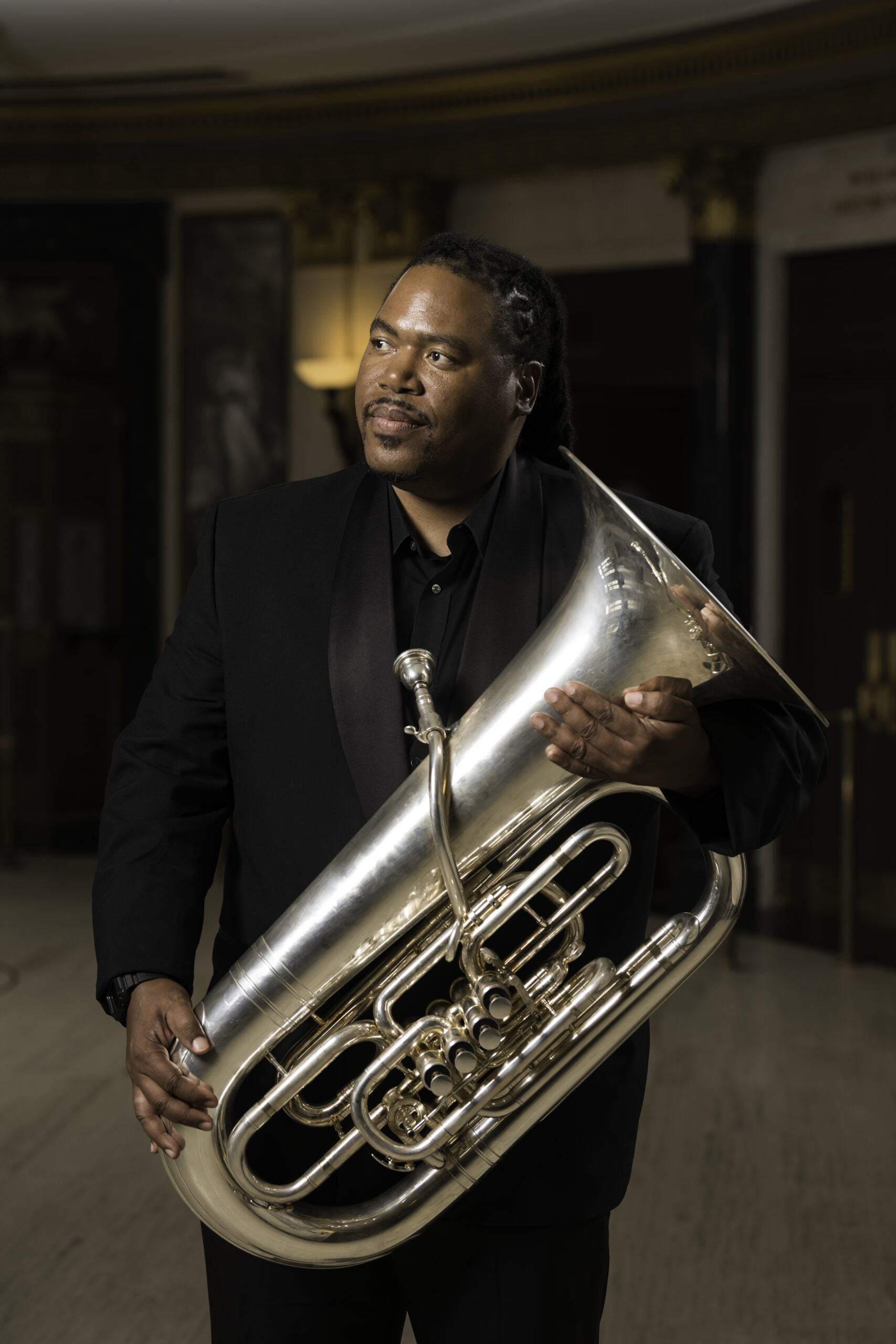Acclaimed tubist shares his story of life as a Black classical artist

Gateways Brass Collective’s Richard White, Principal Tuba, New Mexico Philharmonic; is pictured in the Kodak Hall Lobby at Eastman Theatre September 13, 2019.
Adam Fenster
In an extraordinary true tale of resilience, Richard Antoine White’s new memoir traces his life from growing up fighting for survival on the streets of Baltimore to success as a classical tuba player. He’s now a co-creator of a scholarship for Black music students, the Brothers in Achievement Scholarship at the Jacobs School of Music in Indiana, where White attended graduate school. His new book is “I’m Possible: A Story of Survival, a Tuba, and the Small Miracle of a Big Dream.” White joined “City Lights” host Lois Reitzes via Zoom to share excerpts from his memoir and reflections on a remarkable life that took a village to transform.
White’s precarious early childhood:
“My life, fortunately, or unfortunately, started with me being born prematurely, so small that you could put me in your hand and close it,” said White.
“I had to find food. So I would look in the gutter, find coins, make my way to the open market, and find chicken gizzards or a chicken wing or something, chew a little bit of it, and store the remainder under my tongue because I didn’t know where my next meal would come from,” said White. “The rest of my day consisted of trying to find my mom if we got separated. Most of the time, I was successful, and if I weren’t successful, then I’d find myself sleeping under a tree or on a piece of cardboard or in an abandoned house, and that was my daily routine.”
“This story is not a pity story. This is a story of triumph, resilience, and overcoming. Because I consider my mom a hero, because she did one of the most difficult things there is to do, and that’s to give your kid up, or your child, so that they can have a better chance at life.”
How, in White’s words, “playing music was like a light going on in the dark:”
“I think the tuba represents me. For those of you who have never seen me, I’m 6’5”, 340 pounds. True to form, I could’ve been a football player. The tuba is bulky. The tuba is often the butt of jokes. I think Trevor Noah almost made me pass out, ‘cause he said, ‘The tuba is always the instrument that we joke about, and then you have the sousaphone. Tell me about the sousaphone.’ I said, ‘Yeah, that’s the instrument that you wear,’ and so he goes, ‘Oh, so you actually have to wear the shame?’ And I bust out laughing.”
“The tuba kept me off the streets. The tuba kept me involved. The tuba opened up my world to a more diverse world. I’m often asked, ‘How is it being the only African-American on stage in classical music?’ and my response is, ‘Well, you know, we all choose from the same set of notes,’ the point being that we all have the same goal, and that’s just to make beautiful music.”
Inspirational figures in White’s life:
“[Grandpa Archie] was simple. I think he just loved me. I think it’s love in its simplest form. Our favorite pastime was to sit in his room, eat peppermints, and watch the Baltimore Orioles,” said White, describing his much-loved foster grandfather. “I miss Grandpa Archie dearly. He was a man of very few words, but he showed his expression in the most valuable way that I think you can, and that’s with time. Because time is the one thing that none of us can buy more of.”
“It’s interesting talking about Tupac all the time because a lot of the world knew him as the ‘gangster, thug life rapper.’ I knew him as one of the most intelligent people I’ve ever met. I knew him as the theater major that sat in the cafeteria writing rhymes all day, but could get on the stage and do Shakespeare in iambic pentameter, and just lay it down,” said White. “He encouraged me to read, to be accountable for historical references. He said, ‘You don’t know nothing about the Black Panthers. You need to read the Black Panthers. Man, you need to know your history.’ And as a result, he was so articulate that I started looking up the Black Panthers, wanting to know about history.”
“He’s a dreamer,” said White, speaking of his Indiana University mentor Harvey Phillips. “A few years before, 1976 and 1973, he calls up Rockefeller Center in New York and says, ‘Hey, I want to have hundreds of tuba players come by Rockefeller Center dressed in Santa Claus suits and play Christmas carols.’ They said, ‘Hey, do you know where you have called? Who are you?’ …They checked his references, called him back, and said, ‘….You can have anything you want. When would you like Rockefeller Center’” White continued, “He was the dreamer, full of ideas. He told me that the secret to success is to find something that doesn’t exist, that is needed, and invent it.”
Richard Antoine White’s new memoir “I’m Possible” is out now via Macmillan Publishers here. His website, featuring a blog and information on upcoming projects, is http://rawtuba.com.





